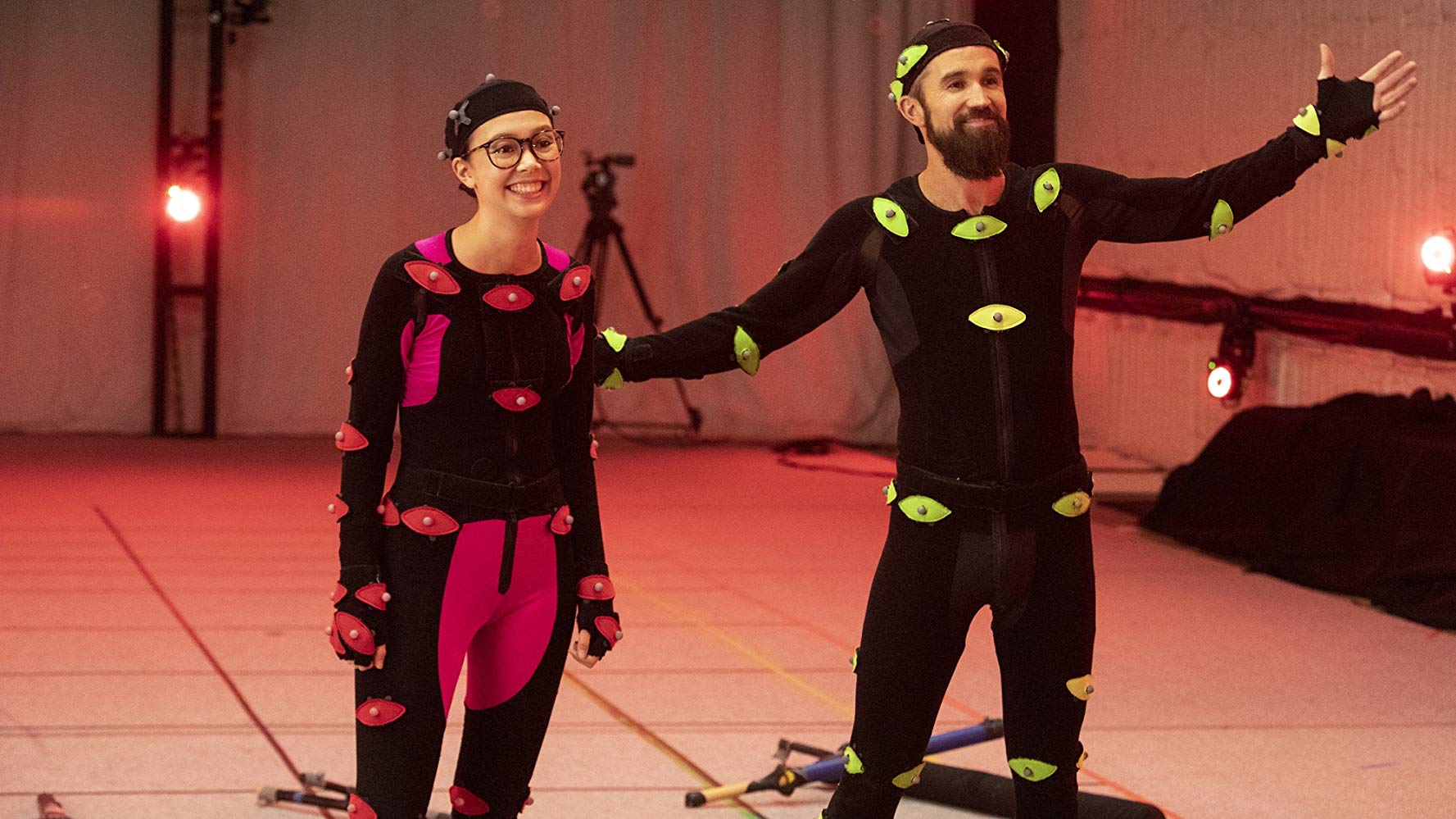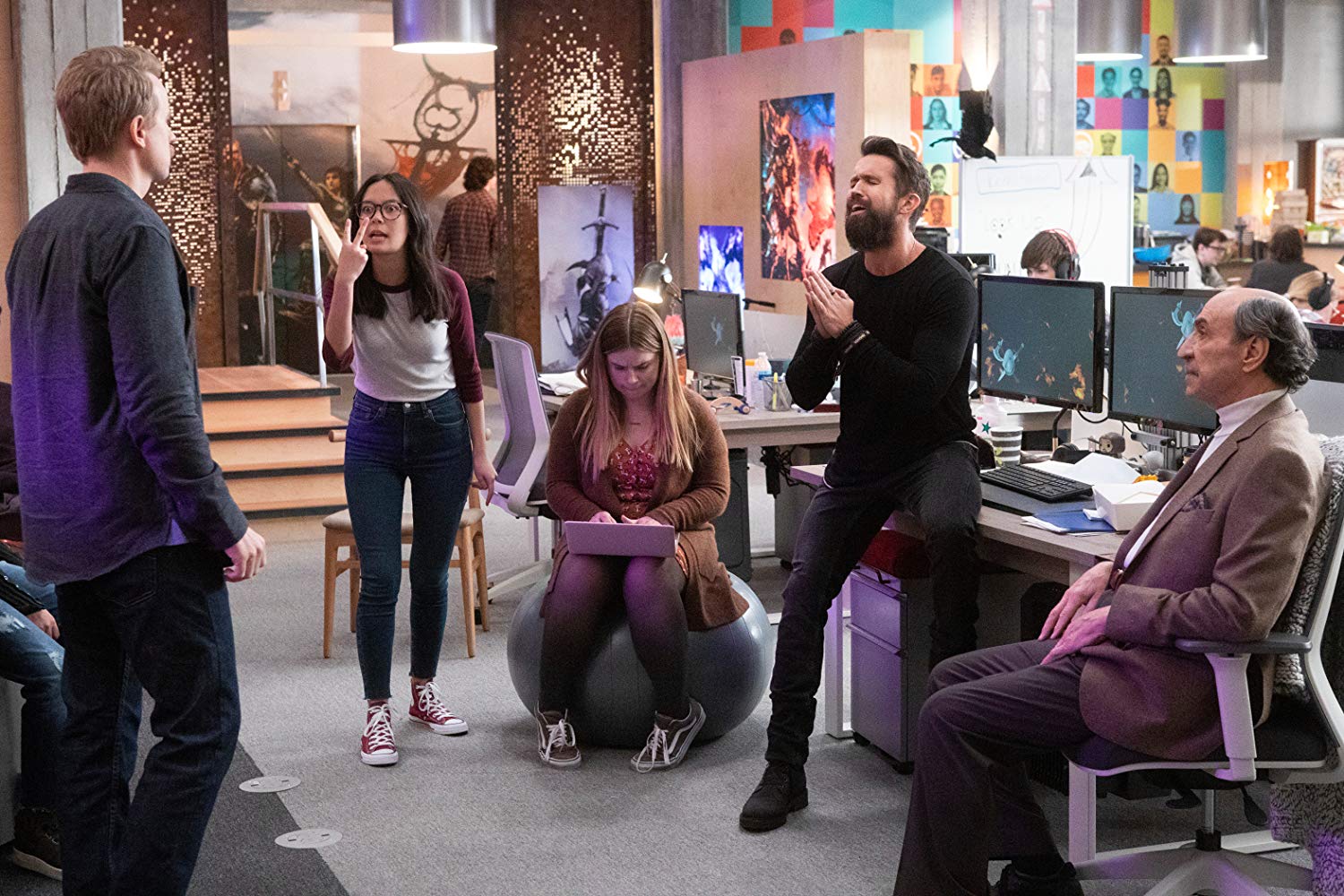The word workplace comedy has become a buzzword over the years, and eventually it has become a buzzkill. You got your Office, Parks and Rec, Brooklyn Nine-Nine. And now Mythic Quest is another workplace comedy. Essentially. You could describe It’s Always Sunny in Philadelphia as a workplace comedy as well. I mean they all work at a pub. But no one ever calls Sunny a workplace comedy, and in the same sense Mythic Quest isn’t one either. It’s so much more and better than your typical workplace comedies. Mythic Quest: Raven’s Banquet is an excellent achievement, which (along with Dickinson) solidifies Apple TV+ its place in the entertainment landscape.
The 30-minute show is off to an amazing start and it feels a little It’s Always Sunny with its lead and how it tackles major topics going on in the gaming industry and the whole world as well—toxic masculinity, (that seems to be McElhenney’s and David Gordon Green’s go-to topic to tackle- see also the absolutely brilliant Vice Principals directed by Gordon Green), sexism, the male gaze in the gaming industry and how it is dominant in marketing, the power of a (toxic) fanbase, the multiple ways of how one can use a shovel, and how stories are created.

Mythic Quest is a studio comprised of Ian Grimm (McElhenney) (Ian is not pronounced as you think), Poppy (Charlotte Nicdao), Brad (Danny Pudi offering his offbeat sensibilities as the man in charge of monetisation), C. W. Longbottom (F. Murray Abraham, who is clearly having the time of his life—I haven’t seen him enjoy something so much since Amadeus) and David (David Hornsby) the co-founder trying to rein everyone in. (Hornsby plays another character in his repertoire that everyone just seems to walk over.) And David’s assistant Jo (Jessie Ennis), who switches to being Ian’s assistant. ‘Cause he’s the bigger Alpha in the office. Your usual assistant shenanigan.
All of them are working on an MMORPG game (imagine Kingdom Come: Deliverance with more fantasy elements—Kingdom Come: Deliverance cutscenes are used throughout this series) and they are about to release their first expansion titled Raven’s Banquet. Simple premise, eh? Wouldn’t really imagine any comedy potential from that. Well in the hands of the team behind It’s Always Sunny in Philadelphia (Rob McElhenney, Megan Ganz and Charlie Day) it turns into comedy gold.The creative trio embeds the humor deeply in the characters as opposed to plainly creating humorous situations. It is similar to how in It’s Always Sunny in Philadelphia the characters are trying to solve a real-life situations (for example the gender-neutral bathrooms in the Season 13 episode or the global warming episode in Season 14) and through the fact of how outlandish the characters are the humor ensues. Here in Mythic Quest the main characters are not as outlandish as in It’s always Sunny in Philadelphia. They are more grounded, yet they still don’t choose the most rational way to solve problems.
Video games and their development usually don’t get a lot of attention, mainly because of their negative connotations when it comes to their adaptations. And those worrying about if this show is for people not playing games or tired of poorly adapted games can be put to rest—this show is truly for everyone. Never played a video game? You will like this nine episode first season anyway. The Sunny influence is heavily felt but also those unfamiliar with that comedy milestone won’t realize it. To put it bluntly MQ is a group of cynical, misanthropic, egotistical people (bordering-sociopaths?) who work together and through their toxic ways they actually manage to create something that millions of people love.

Mythic Quest through its setting deals with a lot of major topics and issues in the gaming industry and on a global landscape as well. These include rampant sexism (here personified by Craig Mazin (yes, that Craig Mazin of Chernobyl) as Lou hitting on a lesbian co-worker and betting he would turn her or the lack of women in the gaming workplace, toxic masculinity, worries about height and the feeling of being threatened about hierarchy (and all the wrong ways to deal with it). There is a whole episode about Nazis (which uses a plot point that seems similar to real life aka Everquest‘s prison server). The show also explores the streaming culture with the studio’s success depending on a 14-year-old streamer named Pootie Shoe and his rating system of buttholes.
The relationship between Ian and Poppy is the main building block that holds the show together. Ian is a man of certain delusions of grandeur, narcissism, and insecurirty, however he is a success of a man. (Ian is reminiscent of Mac from The Sunny Gang—however their sociopathy lies on different ends of the spectrum). Poppy, all the time expressing her frustration with the endless madness, insanity and chaos that is on a daily basis at the MQ, is the straight person, the normal one, the Jason Bateman, for the viewers to make some sense of this, while still delivering a great comedy performance and a character arc of her own. These two character arcs (Ian’s and Poppy’s) and how they tangle in the end are heart and soul of the series. (I am not talking any sitcomy romance, the intimacy of the characters is built upon the creative process. You can’t create something together without getting to know the other people to some extent. It’s refreshing to watch a show and actually not have any romantic subplot in it.) So there are laughs and some real feelings as well.
The series abandons its cast and its format midway through the season for an episode starting in the ’90s following the origin of a couple and their relationship and how it affected the creative process. Or how the creative process affected the relationship. It’s also about how when a creation goes mainstream, then it may no longer be your own creation. Some big conglomerates come in and turn it into their own thing. It’s about how good things turn bad.Their love for videogames is what unites them (their nicknames are Doc and Beans as in Dr. Robotnik’s Mean Bean Machine) and also the saying “If you don’t find a video game you like, make your own”. So they do. And they create the least mainstream game there is titled Dark Quiet Death with no boss fights and no way to fight off the monsters, you just play to survive. Just like in real life. And surprise, surprise, the game is a success. And with success comes a sequel and you can’t just do the same thing again, it’s gotta be different. So the marketing and creatives want to get rid of the dark, and then the silence, leaving just the death in the title. Which doesn’t fly well with Beans but Doc is more savvy in how the industry works. So then Beans is gone from the process. And then comes a movie. Which seemingly has nothing to do with the original game, just the title. And then come more changes, where Doc no longer recognizes his (their) own creation. It’s heartbreaking and it’s an accurate behind-the-scenes look at the creative industry and life.
As the story progresses you might wonder what this show will be about. The game expansion is released, what more is there to do? Well, the sociopathy of your co-workers might be sometimes too much and you want to switch to the competing company, but is that the right decision? Poppy is on the fence on this as she discovers more and more reasons to stay. And more and more reasons to leave. Also Ian is still dealing with his daddy issues (read that in every way you can) and that revelation proves to be a jaw-dropper. And after all the drama is done there is seemingly a happy ending. Ian, Poppy, David and everyone else learn how to work together peacefully, putting all their hatred and toxicity behind…
For about about 15 minutes. That’s as good as it gets.
Mythic Quest: Raven’s Banquet is about gaming, the game industry, and the workplace. However above all else, it is about what happens when a story is created, and about the struggles of the creative process. In the end it is about creating an environment where everyone feels heard, and their idea contributes to the whole. Sometimes it seems, and is presented as though one man is responsible for some creation, when in reality there is a whole team of some very capable men and women—some jerks, some are star-struck, some who are trying to appear macho, and some good people as well. Because that is teamwork, right? Unless you are the boss and you know the best, and you are just the painter and everyone else is your favorite paintbrush to use an analogy that Ian Grimm would appreciate.
Mythic Quest is a masterclass, and a masterstroke in comedy and I am so happy it exists. The second season can’t get here soon enough.

